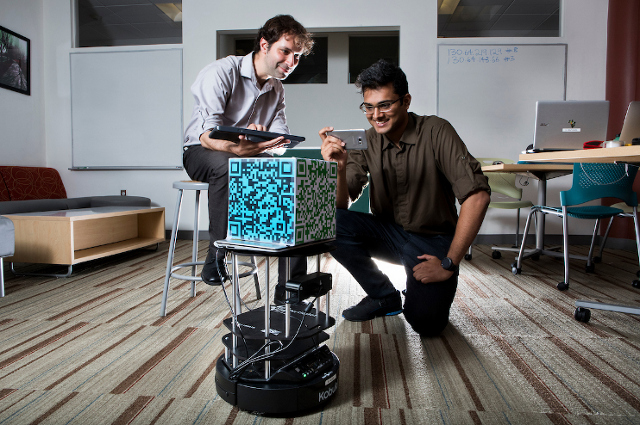Faculty spotlight: Jivko Sinapov

Assistant Professor Jivko Sinapov is excited about the Verizon 5G EdTech Challenge. His team – including Professor and Chair of Mechanical Engineering Chris Rogers and Center for Engineering Education and Outreach postdoctoral associate Jennifer Cross, with students Faizan Muhammad, E20, Amel Hassan, E20, and Ph.D. candidate Andre Cleaver – was named one of ten winners in the nationwide competition, and Sinapov is ready to get to work. The team's project is designed to use “augmented reality” to expose the hidden world of the robot to K-12 students.
The robots of Sinapov’s childhood weren’t in his classrooms but instead were the mainstays of Star Wars and Star Trek. R2-D2 and Data, along with computer games such as Civilization and Age of Empires, were the inspiration that led Sinapov into computer science. From the time he entered college, his professional life has been focused on artificial intelligence.
It’s clear that Sinapov, now named the James Schmolze Assistant Professor in Computer Science and nearing the end of his second year on the Tufts faculty, enjoys being here. He finds that the quality of students sets Tufts apart. Undergraduate and graduate students alike are motivated outside of class, and they’re banging down his (email) door to be involved in research. In fact, Sinapov says the best thing about Tufts is the “ability to pursue the work that interests me with a long-term impact on society, and [that] I get to do it with students.”
Faizan Muhammad, a junior working in Sinapov’s lab, is one of those motivated students. Last year, when Sinapov was still new at Tufts, Muhammad emailed to ask if he could participate in Sinapov’s robotics research. Sinapov provided a list of skills that Muhammad would have to learn, started him with the simple task of logging robot data produced during autonomous operation, and welcomed him to the team. Since then, Sinapov has mentored Muhammad through the lab’s research in augmented reality. The result? Muhammad was a summer scholar in Sinapov's lab in 2018, and this year, he spent spring break in Daegu, South Korea at the Human Robot Interaction 2019 conference, where he presented a poster on using augmented reality interfaces to reveal the hidden world of a robot to human users.
Muhammad explains his work this way: Robots don’t understand body cues to convey intent, and they don’t provide them either. So when people and robots both walk towards each other in a hallway, it may give rise to the familiar human experience in which both parties step to the right, then the left, then the right, continuing to block each other's paths until they are able to coordinate their movements and pass each other. With augmented reality, people could view robots with arrows that indicate where they plan to go, something like you might see on Snapchat photos. One might also see the robot’s path on the ground. Put together, this capability would help people feel more comfortable passing robots without fear of collisions.
Mentoring Muhammad and the other students in his lab fits perfectly with Sinapov’s desire to help students grow. The proceeds from the Verizon 5G EdTech Challenge will help satisfy another of his passions, which is ensuring that students arrive in college with the right background to enjoy learning.
When asked what he’d like to share with alumni, Sinapov wanted to point out that, while “there is anxiety about how AI will change our lives, AI isn’t this one monolithic thing. It’s actually a diverse set of algorithms and methods. There are many different programs. There are many serious ethical issues to be considered but often they get lost in the hype of news articles that do not get the research right.” Sinapov doesn’t need to hype. His parting message to alumni is simple: “Keep in touch! We’re doing interesting things here.”
Department:
Computer Science